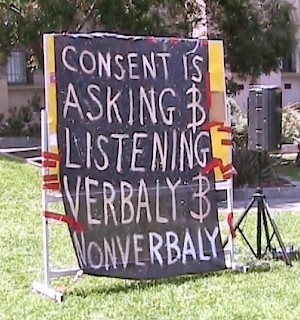So I was just reading this article about a man with a low IQ who has been banned from having sexual relationships. And it makes me so angry, for multiple reasons.
I know it's complicated. There's been a lot of papers written on the subject, and what is consent if not informed consent. I've also always been a proponent that age doesn't necessarily mean you're better or worse at communicating and negotiating (thus creating informed consent), and that informed consent also is dependent on agency- for example, an issue with incest between people who are over 18 revolves around whether the relationship is still a dependent one, in my opinion (if we're moving out of the realm of blind morality).
Can someone with an intellectual disability give consent to sexual activity? Does someone with such a disability have the agency needed to say no, thus making their yes mean something? And does society/government have the right to tell them that they can't have a sexual life? What about reproductive rights? Can a carer consent for them, as they do for many other activities, like medical ones?
The whole conversation around sex and mental retardation is touchy. This tends to taint the discourse quite a bit, as people are obviously uncomfortable with it. To deal with this, people make fun of the idea often, as shown by this, which is just an example:
The first type of role playing you may want to try is "Mentally/Physically Handicapped Sex." I'm not making fun of retarded people. Actually, in this respect they have a pretty good thing going for them. Imagine being with your partner and not being able to use anything but your mouth or genitals. Pretty hot, right? Pretending you're handicapped makes you worse than a virgin. -http://www.ubersite.com/m/67145
One of the things brought up in this discussion is the worry that people might take advantage- if consent is uncertain, then ability to report assault is also uncertain. I agree, that's a possibility (though as one friend pointed out around the article mentioned in the beginning- would it be seen differently if the man with the disability was in a heteronormative relationship..? And wait a minute- carers take advantage in nonsexual ways all the time, yet we don't propose to ban carers. Is this yet another example of sex negativity?
There's a lot of papers covering the idea of facilitated sex for people with disabilities- in the US for example, it's legal to facilitate sex and be paid for it, but not to pay a sex worker. In the UK wheelchair access issues can make it next to impossible for people with disabilities to get out and meet anyone, so thank goodness for things like Outsiders that do what they can to help! But people with a developmental disorder have a different set of needs when it comes to sexuality... how do we deal with that?
One of the other things I was annoyed at in the article was this bit:
One psychiatrist said that he would be confused if sex education was given to him.
Did they even try..? I mean, ok, let's say you want to ban intellectually disabled people from having sexual expression. Let's say you do that. If you haven't offered the person any sort of sex education, then how would they know if they've been sexually assaulted by, say, a carer? Same with kids, in my opinion. If you give your kids a basic idea about things like masturbation, sexual touch, and boundaries/saying no, they'll have an easier time telling you if an adult tries to take advantage- and be better equipped to deal with it in the moment. Sex education is important for everyone- here's an example of something I had as a kid, and here's something resource-wise for sex ed with people dealing with developmental disabilities. It can be done. It NEEDS to be done.
By refusing to try multiple methods of communicating these ideas for people all over the developmental spectrum, you're basically denying them the tools they need to consent in the first place.
So in the case of creating a standard, what would someone with a developmental disability need to be able to understand? I liked this definition of informed consent:
Informed consent means that the person is aware not just of their rights but also their responsibilities. Both parties are expected to fully understand how women get pregnant, methods of birth control, sexually transmitted diseases, how to use a condom, be able to define sexual abuse, and can say “No” appropriately and effectively.
-From Intimate Relations (sex) and the Developmentally Disabled
I think that's a really good way to define this, especially a bit about understanding not only the rights but the responsibilities of sexual behavior.
So then what do I propose?
Why not do what some councils in the UK and have councils pay for prostitution services for the disabled? I'm listed on the TLC Trust, a great charity that connects comfortable sex workers with disabled clients- what if they had a program where you could get a certificate after attending training courses, say, to create a sense of standards? You'd have to be willing to put in the work in order to get the certificate, and it'd be a way to teach sex workers various methods of working with and communicating with people who have various disabilities.
Interested in this topic? You might find this an interesting read, and here's two books on the subject, Enabling Romance and The Ultimate Guide to Sex and Disability.
And I'd love to know your thoughts on this!

Be the first to comment
Post a comment